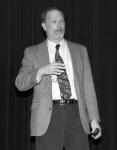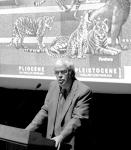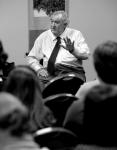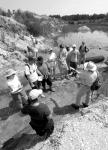For the past three years, the Evolution Learning Community (ELC) at the University of North Carolina, Wilmington, has sponsored a variety of speakers, courses and public events related to the study of Darwin and evolution. These activities will culminate in the year-long commemoration in 2009 of the 200th anniversary of Charles Darwin’s birth and the 150th anniversary of the publication of On The Origin of Species.
After the success of a similar learning community focused on Brown v Board of Education in 2004, the campus began to discuss the feasibility of a multiyear, interdisciplinary learning community on the topic of evolution. Developed through a grassroots faculty effort and endorsed by the Faculty Senate, the ELC is dedicated to the study of the theory of evolution and its scientific, social, and moral significance for humanity. The executive council of the ELC is headed by Patricia Kelley, Professor of Geology and long-time NCSE Supporter, Dale McCall, Professor of Anthropology and Genetics, and Thomas Schmid, Professor of Philosophy.
Schmid, one of the founders of the group, said of the ELC: “We were looking for a campus-wide series of events that would be long-lasting and substantial and might generate some curricular change. We’ve taken a very academic approach. The focus is not to create a debate on evolution but to develop dialogue and educational opportunities for UNCW as well as the larger community.”
The group has coordinated educational and cultural events for students, faculty, staff and the community to increase awareness and critical discussion of the role of evolutionary principles in the natural and social sciences and in relation to the philosophical, historical, artistic and literary modes of reflection on life.
Activities have included more than 50 formal ELC-related courses per semester, the Visiting Darwin Scholars lecture series, discussion groups and Honors enrichment seminars, cultural events such as film screenings and an art show, community outreach with public lectures and Continuing Studies courses, faculty professional development and student research opportunities, ELC-related publications, and a faculty and student trip to the Galápagos Islands. Visiting Darwin Scholars have included Richard Leakey, EO Wilson, Stephen J O’Brien, and NCSE Supporters Ken Miller and Niles Eldredge. Details and information about the program and events is available on line at www.uncw.edu/evolution.
The work of the Evolution Learning Community will culminate with several significant events in 2009. In March, UNCW hosts “Darwin’s Legacy: Evolution’s Impact on Science and Culture — A Multidisciplinary Student Conference.” The conference is open to undergraduate and graduate students in the natural sciences, social sciences, humanities and arts who are conducting research or creative endeavors related to evolution. Faculty members supervising student research are also encouraged to attend. In addition to oral and poster presentations of student research, the conference will also feature keynote speakers David Buss, a leading theorist in evolutionary psychology; Peter Carruthers, a leading theorist in evolution and language; David Mindell, Dean of Science and Research Collections at the California Academy of Sciences; and Kevin Padian, vertebrate paleontologist, witness at the Dover trial, and president of the NCSE board of directors.

| 
| 
|
Stephen J O’Brien, Richard Leakey | ||
|---|---|---|
“The breadth of programming and strong student involvement has been a key to the success of the ELC,” said Kelley, executive administrator of the group and herself a nationally known speaker on evolution and religion. “We have had increased dialog among faculty and between faculty and students as a direct result of the ELC effort. These are important scholarly conversations that would not have happened without this initiative.”
Other major events planned for 2009 include Visiting Darwin Scholars Eugenie C Scott, executive director of the National Center for Science Education; Dirk Robert Johnson, Associate Professor of Modern Languages at Hampden-Sydney College, whose scholarly work explores the intellectual interaction between Darwin and Nietzsche; Philip Kitcher, John Dewey Professor of Philosophy at Columbia University and NCSE Supporter; and David Quammen, award-winning author of The Reluctant Mr Darwin. For academic year 2008-2009, the ELC coordinated a Visiting Darwin Scholars competition to fund visiting scholars. Illustrating the interdisciplinary nature of the ELC, proposals to bring speakers to campus came from the Departments of Anthropology, Art and Art History, Biology and Marine Biology, Chemistry, Creative Writing, English, Foreign Languages and Literatures, Geography and Geology, History, Philosophy and Religion, Psychology and the Watson School of Education.
In addition, Ecotone, the university’s literary journal edited by David Gessner, Assistant Professor of Creative Writing, will publish a special issue in spring 2009 celebrating the Darwin anniversaries. Through the Ecotone Evolution Contest, the journal accepted submissions in poetry, fiction and nonfiction that creatively reflect the subject of evolution. The magazine sought bold interpretations of a theory that has radically altered the experience of being human: What does it mean to share our DNA with other animals? What are the consequences of our diminishing biodiversity? Why have political lines hardened around an issue so rooted in science?
 Students participating in the NSF-funded ELC-related summer program Research Experiences for Undergraduates in Biodiversity Conservation.
Students participating in the NSF-funded ELC-related summer program Research Experiences for Undergraduates in Biodiversity Conservation.
A special issue of the Journal of Effective Teaching, an online peer-reviewed journal dedicated to teaching excellence and edited by UNCW faculty member Russell Herman, will be devoted to the teaching of evolution in a university setting. Submissions for the special issue, to be published in fall 2009, will be accepted through May 1.
Throughout all of the activities and events related to evolution, the ELC has maintained one basic premise: no matter how one views the meaning of Darwin’s revolutionary work for modern thought, there is no denial that it transformed biological science and the picture our society has of humans in nature. This statement has formed the basis for inquiry and dialog related to evolution, bringing an entire university campus together to consider what it means to be human.
For more information, connect to the Evolution Learning Community web site at www.uncw.edu/evolution.
